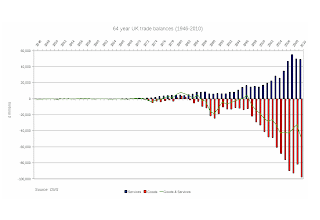UK government annual overspend since the last world war
Do Conservative governments spend prudently, frugally, and wisely and Labour governments overspend - both for ideological reasons? There is often talk that Conservatives in UK politics spend wisely and within their means, sometimes repaying debt - whilst Labour governments tend to (or always) overspend, and increase debt. The chart above clearly shows that all governments overspend, all the time. (I haven't marked in the years of each party, but they are roughly equal). In fact Conservative governments increased the debt in more years than Labour governments did.
Consistent and persistent overspending - There are only about 6 years since 1946 when government has spent what it raised in taxes or spent less than it raised. As a result, in almost every year for 65 years, the government's debt has been increased.
The so-called "Nixon shock" - when US President Richard Nixon took America off the gold-standard for overseas currencies - seems to mark a rapid and significant change in the level of government overspending. Overspend and underspend before 1971 is so small you can't even read it on this scale. After 1971 the overspends increase rapidly and are visible on the scale. This rapid and increasing overspending coincides with rapid money supply growth and sustained and large inflation. This is not a random uncorrolated co-incidence.
The annual overspend above, when accumulated, is of course the total governement debt. Total government debt is often expressed as a % of GDP - it is common and it is misleading. Not only is the debt not serviced or repaid from GDP, it is serviced and paid from tax collected, but also GDP is not deflated as fast as prices rise, so that the quoted GDP number grows faster than the real productive economy, which overstates GDP (the denominator) relative to the debt (the numerator), and over 65 years the effect of this phenomena is to reduce the debt to GDP ratio % - which looks good - the economy is actually less able to support the debt.
Note the Wave formation, with long periods of overspend or "deficit", and punctuated by short periods of underspend or "surplus" (repayment of debt), which increase in amplitude with each cycle, like a resonating system at a natural frequency. Systems which resonate at the systems 'natural frequency' suffer a feedback loop which physically destroys the system - a catastrophic failure. This latest swing down looks terminal.
Consistent and persistent overspending - There are only about 6 years since 1946 when government has spent what it raised in taxes or spent less than it raised. As a result, in almost every year for 65 years, the government's debt has been increased.
The so-called "Nixon shock" - when US President Richard Nixon took America off the gold-standard for overseas currencies - seems to mark a rapid and significant change in the level of government overspending. Overspend and underspend before 1971 is so small you can't even read it on this scale. After 1971 the overspends increase rapidly and are visible on the scale. This rapid and increasing overspending coincides with rapid money supply growth and sustained and large inflation. This is not a random uncorrolated co-incidence.
The annual overspend above, when accumulated, is of course the total governement debt. Total government debt is often expressed as a % of GDP - it is common and it is misleading. Not only is the debt not serviced or repaid from GDP, it is serviced and paid from tax collected, but also GDP is not deflated as fast as prices rise, so that the quoted GDP number grows faster than the real productive economy, which overstates GDP (the denominator) relative to the debt (the numerator), and over 65 years the effect of this phenomena is to reduce the debt to GDP ratio % - which looks good - the economy is actually less able to support the debt.
Note the Wave formation, with long periods of overspend or "deficit", and punctuated by short periods of underspend or "surplus" (repayment of debt), which increase in amplitude with each cycle, like a resonating system at a natural frequency. Systems which resonate at the systems 'natural frequency' suffer a feedback loop which physically destroys the system - a catastrophic failure. This latest swing down looks terminal.



Comments
Post a Comment